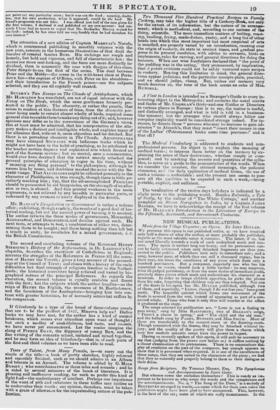NEW MUSICAL PUBLICATIONS.
Music from the Village Coquettes ; an Opera. By JOHN HLLLAH.
WE presume this opera is not published entire, as ,ve have received only half-a-dozen of what the author, or more probably the publisher, regards as the most saleable songs it contains. The latter, if so, has not acted liberally towards a work of such undoubted merit and suc- cess. The opera is neither long nor heavy, and its pretensions can- not be fairly estimated when only detached fragments are thus pre- sented to the public. Publishers look only to immediate sale; and a song, however poor, of which they can sell a thousand copies, has in their eyes, ten times the excellence of any piece which finds only a hundred purchasers. But a composer, especially one who has his reputation to create, should look a little farther : he may suppress, from ill-judged parsimony, or from the mere desire of immediate profit, precisely those pieces which mark and authenticate his character as a musician. In order to tempt childish appetites, be picks the plums from his cake, forgetting that children only are thus tempted. Not one of the duets in his opera has Mr. HULLAII published, although two of them, and especially, " Listen, though I do not fear you," have great merit. The beautiful quintet which forms one movement of the finale is severed from the rest, instead of appearing as part of a con- nected whole. Those who hear it only thus will wonder at the effect it produced on the stage. The songs selected for publication are, " Love is not a feeling to pass away," sung by Miss RAINFoRTH; two of BRAHAm's songs, " There's a charm in spring," and " The child and the old man," and the ballads sung by PARRY, BENNETT, and Miss SMITH. Most of these are transferable to the concert-room or the drawing-room. Though connected with the drama, they may be detached without in- jury; and the quality of the poetry will give them a charm which very few modern operatic songs have the power to impart. Having so recently spoken of this opera, it will only be necessary to say that (judging from the pieces now before us) it suffers nothing by a closer examination of its pretensions. There is no ostentatious dis- play of erudition on the part of the composer, but enough appears to show that it is possessed when required. It is one of the excellences of these songs, that they are suited to the characters of the piece ; we feel that they as naturally and properly belong to them as their dialogue or their dress.






























 Previous page
Previous page